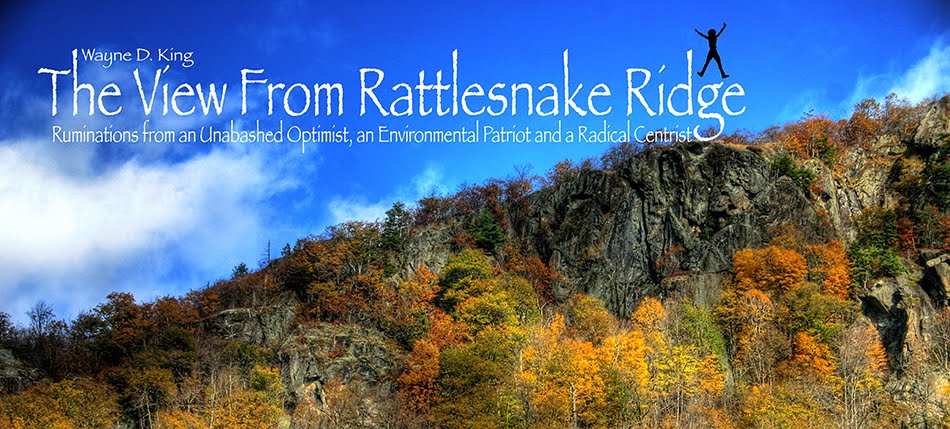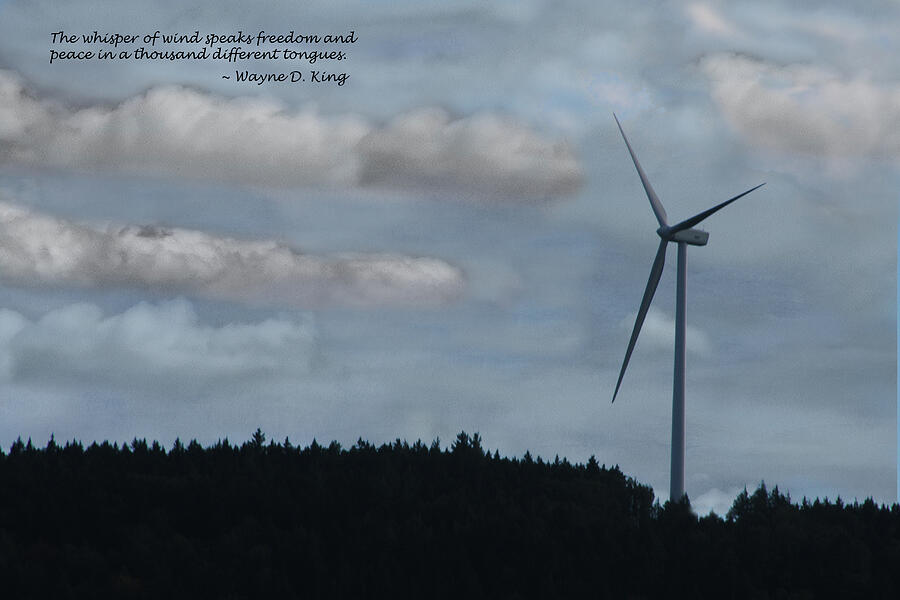The View From Rattlesnake Ridge
Ruminations from an Unabashed Optimist, an Environmental Patriot and a Radical Centrist
The Sorkin Solution
A “West Wing style” Unity Slate for Supreme Court might begin to heal the wounds and restore the Court’s standing
This past spring, in the throes of the early days of the pandemic I went for my twice-daily walk along the path to the Welch Mountain trailhead, stopping by the beaver pond along Orris road. I sat by the pond quietly watching for the pair of beaver that I had greeted almost every day before the ice formed in late fall and realized after an hour that something was wrong. How many days had my dog, Boof, and I visited that pond in the past year and seen our erstwhile pals every day? How many times had the loud “SLAP” of their tails served as both greeting and warning of our intrusion into their peaceful world? They were gone.
A month later when I had the opportunity to interview legendary mid-wife and author Carol Leonard, guardian of about 400 beaver on Bad Beaver Farm in Maine - and author of “Tales from Bad Beaver Farm” - she suggested that they may have run out of softwood - a staple of their diet. They may also have just decided to move on for any of a half dozen other reasons, or, they could have been “trapped out” during the winter. In any case, they were gone and I was denied the joy of their company on my daily pilgrimage to the pond. I’ve had my fair share of mourning over the last year and a half but it still felt a bit like an added dose in the midst of a pandemic.
In addition to this, I’ve been mourning for my country. Yearning - not for bygone days - but for what seems like a loss of shared values that allow us to reach beyond differences of opinions toward that mythic “more perfect union”. We have made so much progress in the last 60 years, yet it seems, in these past four, that we’ve all simply stopped listening to one another. With this lack of communication and community has come a decaying of the institutions that have been the vanguard of our progress, among them the US Supreme Court.
I expect this idea will elicit slings and arrows from plenty of people from all around the political universe, but hear me out.
We all know that the divisions between Americans over the Supreme Court have grown increasingly poisonous since Mitch McConnell spent more than a year bottling up the nominations of hundreds of judges during the Presidency of Barack Obama, culminating with the blocking of the nomination of Merrick Garland as Associate Justice of the US Supreme Court.
A solid majority of American citizens believe that we should wait until the next President is inaugurated before choosing a replacement for Justice Ruth Bader Ginsberg. This is understandable. Despite the verbal gymnastics of McConnell, Lindsay Graham and other Senators who pledged to follow the “McConnell rule” established to prevent Merrick Garland from being seated. A majority of Americans are justifiably disturbed by the hypocrisy that has the Senate barrelling toward confirmation of Judge Barrett contrary to those promises. The American people are clearly moved by a sense of fairness and justice. They are clearly also concerned about what is likely to happen to the Affordable Care Act and the Roe Decision in the wake of a Barrett confirmation.
 |
| The Winter Warrior |
Sadly, just as Judge Garland was caught up in the political warfare of the 2016 election, so too is Judge Barrett in the 2020 election. Let’s face it, if Judges Garland or Barrett had been nominated in the more collegial days that Justice Ginsberg was (RBG was confirmed by a near-unanimous vote), both would have been confirmed without question. Unlike many of the nominees of Donald Trump - who have been panned by their peers as unfit - Both Judge Garland and Barrett have broad support from their peers of all political persuasions. Both are individuals of honor and integrity, both are hailed for their hard work, their understanding of the law and their ability to work with peers.
We can’t go back to the days of civility easily and without some form of redress for the excesses of this partisan era. If we try, we will be caught in an ever-widening and increasingly vicious cycle of recrimination, reprisal, and its accompanying bending and breaking of democratic norms.
Without a game-changing idea we are doomed to suffer through perhaps decades of all-out political warfare over the Supreme Court, with each swing of the political pendulum initiating the abandonment of more and more of the norms and democratic guardrails that encourage comity and civility at the core of vigorous debate.
We need to find our way back to a place where our shared American values take precedence over our differences. Where we see our opponents as the loyal opposition not the enemy. This was the example of Justice Ginsberg. It was also the example of her good friend on the court, Justice Scalia. Each stood strongly for their ideals. Each stood up to one another on the judicial “battlefield”; but each saw the humanity, integrity, and commitment to the rule of law in the other and drew first from that well of goodwill.
I suggest that Joe Biden propose an American Unity slate for the Supreme Court. To be confirmed following the election by the next congress. Ideally, both Presidential candidates would commit to the idea but like JFK’s nuclear test ban challenge issued to the Soviets in the early 60s, Biden’s leadership can set the course of the debate.
In exchange for holding off on the appointment of Amy Coney Barrett until after the inauguration of the next president, Joe Biden should propose and pledge to honor the creation of a national unity slate for the Supreme Court, specifically intended to heal the divisions within the country and to balance the Supreme Court, to include Barrett, Garland and one Justice to be named by Biden from his own list of candidates.
While this proposal - loosely inspired by an episode of “The West Wing” by Aaron Sorkin - would increase the size of the court by two justices, the National Unity benefits far outweigh the fears expressed about court-packing and do justice to both Judge Garland and Barrett. There is no reason why it should be seen as anything but an effort to correct the wrongs inflicted by the McConnell Senate and a forthright effort to restore balance to the court, without an all-out arms race - to continue the JFK metaphor.
It is true that the court would still maintain a slightly conservative-leaning but Justice Robert’s has demonstrated that he cares more about the institution than ideology. His hero, Justice John Marshall, was - arguably - the greatest Chief Justice in American history and I have come to believe that Marshall’s example is an important touchstone for Roberts and presents the opportunity for Roberts to burnish his legacy as the Chief Justice who restored the Court’s standing.
Through no fault of their own, the reputation of the Supreme Court has been tarnished in the last few years. Yet, faith in our highest court is of paramount importance in these times of maximum danger to the Republic.
Restoring faith in the court and our judicial system is worthy of serious consideration - after all there is no constitutional provision that dictates the number of justices on the court and the reasoning behind a national unity slate is solid and presents legitimate arguments against a future expansion for purely political purposes.
There is a runaway train speeding down the tracks of the American judicial system. A national unity slate may be the last chance to control it before we all end up tied to the rails.
About Wayne D. King: Wayne King is an author, artist, activist and recovering politician. A three-term State Senator, 1994 Democratic nominee for Governor; he is the former publisher of Heart of New Hampshire Magazine and CEO of MOP Environmental Solutions Inc., and now a columnist for the New Hampshire Center for Public Interest Journalism (inDepthNH.org) where he writes “The View from Rattlesnake Ridge” and hosts two Podcasts: The Radical Centrist (www.theradicalcentrist.us) and NH Secrets, Legends and Lore (www.nhsecrets.blogspot.com). His art (www.waynedking.com) is exhibited nationally in galleries and he has published three books of his images and a novel "Sacred Trust" a vicarious, high voltage adventure to stop a private powerline - all available on Amazon.com. His art website is: www.waynedking.com , and his writing site: http://bit.ly/WayneDKing . He lives in Thornton, New Hampshire at the base of Welch Mountain where he proudly flies both the American and Iroquois Flags.











